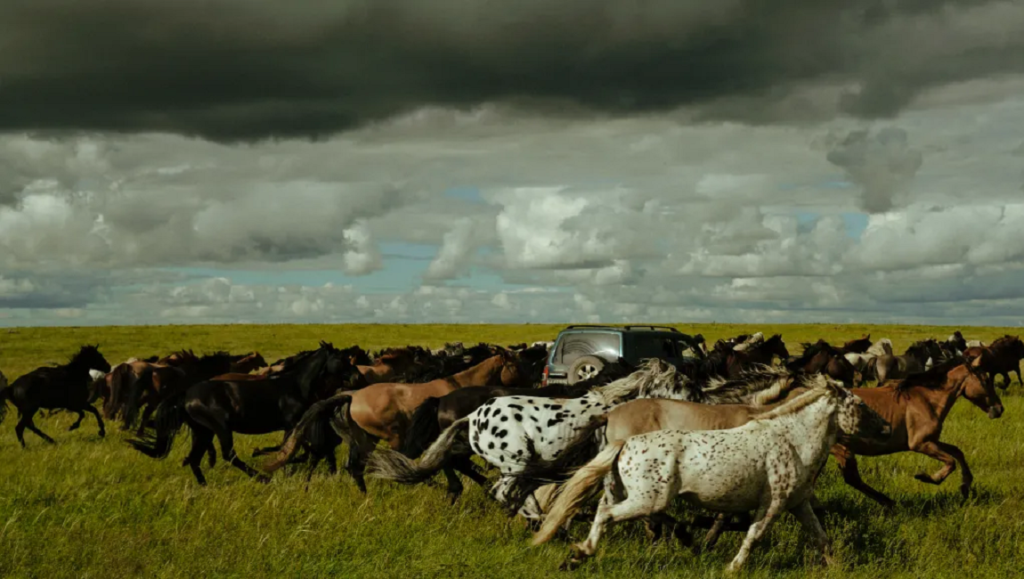One of the central tensions in cinema is that of authenticity: The inherent power of this medium comes from its depiction of images and experiences drastically foreign to the viewer, even foreign to our reality. But there’s also an impulse towards depicting reality, the expectation that art should speak to material concerns in a genuine way and reflect individuals’ lived experiences. With that in mind, it makes a perfect kind of sense that there’s such a disproportionate number of films about filmmaking; these films unite a filmmaker and their audience, the artist essentially depicting their own experience and the viewer allowed to peer behind the curtain of the art form. Think about this, though: What if, in lieu of tumultuous tales of adventure and romance inflated from the most exciting moments of his life, Hemingway had dedicated his career to just chronicling the process of putting pen to paper? OK, this may be a cruel way to introduce Wei Shujun — a young Chinese director whose first two features have both been loose metatextual dramas following a film’s cast and crew and their lives adjacent to a shoot. Wei is the kind of filmmaker created by a society where Jia Zhangke — despite being notoriously categorized in Paul Schrader’s diagram as outside “The Tarkovsky Ring,” i.e. too abstract for profitability — is a mainstream commercial success, even a household name.
Wei’s autobiographical debut, the dryly comic Striding Into the Wind, follows author surrogate Kun (played by Zhou You), a sound recordist embarking on the early stages of his career while taking remedial classes in film school. Kun is the image of directionless, youthful iconoclasm: irreverent, work-shy, and often less than kind to those around him. While working on a graduation film directed by his lecherous friend, Ming (Wang Xiaomu), Kun drifts in and out of dead-end work, while also struggling with his relationship with his girlfriend (Zheng Yingcheng) — in short, he lives a financially and socially destructive lifestyle. As Kun, Zhou exudes the charismatic energy of contemporary Chinese alternative culture — largely detached and cynical but occasionally wild, in moments of passion or chaos. Kun is working on a film about an Inner Mongolian herdswoman, who comes to Beijing to find her husband. Ming, that film’s director, is anxious to spruik the fact that he was originally from Inner Mongolia — and yet, his work is anything but authentic. At first, Ming’s crew attempts to use a secluded bit of unused parkland in Beijing, surrounded by towering apartments and a makeshift yurt, to replicate the grasslands of Mongolia. When reviewing the footage, though, they realize how transparent the set forgery truly is, and decide to travel to Inner Mongolia to shoot some more genuine locations.
In one sequence at a hotel in Inner Mongolia, after a party with traditional dancers is thrown for the film crew, the manager of the hotel asks Ming, enthusiastically, to send him a copy of the movie that they’re shooting so he can use it as promotion. In this scene, Wei manages to speak volumes to the relationship between Chinese filmmakers and the communities they so often choose to depict: The herdswoman in Ming’s film is every ethnic minority “noble savage” brought to the screen by a Beijing director, the hotel owner all those who are happy to profit off their foreignness to the majority in a hyper-commercialized modern China.
For a film about cinema, Striding Into the Wind is surprisingly light on references to actual movies. There are few films or filmmakers explicitly mentioned, save for some name-drops of Wong Kar-wai and Hong Sang-soo, and one blink-and-you’ll-miss-it, pixelated clip from a particular ‘80s Chinese film that flashes by so fast as to inevitably be anonymous. Nevertheless, Wei is very much drawing on his medium’s history; his narrative’s progression is delineated by the presence of Kun’s dodgy, second-hand jeep, which in a way, is a motif reminiscent of those often employed in works from the cinematic milieu in which the aforementioned clip originated (China in the 1980s), such as the titular mill in Wu Ziniu’s The Big Mill. Striding is also preoccupied with another inheritance from that era, Chinese filmmakers from elite film schools in major cities venturing out to rural and culturally disparate parts of the PRC to make their work.
Wei attempts to target the shallowness of the Beijing art student scene specifically: From Kun’s toxic behavior (e.g. stealing exam papers from his mother’s school to sell, shattering her credibility), to the faux bravado of his filmmaking peers, to the pervasive depression that always seems just beneath the surface, Striding paints a stark portrait of this world. And yet, the filmmaker’s intended critique of the superficiality of the Beijing art scene ultimately fails, due to its reverent indulgence in every aspect of this culture. We see little that redeems the antisocial Kun, but Wei colors him a tragic hero simply for his (emptily) rebellious attitude. Similarly, Wei’s depiction of the student filmmakers is summarily more of a glorification than a critique. And so for a film so invested in throwing us through loops and narrative contrivances, Striding Into the Wind has little concrete to say about anything, and we’re left with an unsatisfying watch. But Wei is nevertheless a talent to keep an eye on; perhaps the biggest compliment one can make to him is that this is the work of an auteur with a distinctive vision and the talent to realize it. On that front, there’s already some good news: if word from Cannes this year has any truth to it, Wei’s even newer feature, Ripples of Life, might be a major breakthrough.
Published as part of CineCina Film Festival 2021.


Comments are closed.